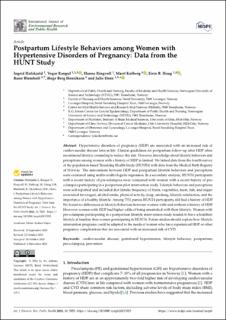| dc.contributor.author | Hafskjold, Ingrid | |
| dc.contributor.author | Rangul, Vegar | |
| dc.contributor.author | Ringvoll, Hanne | |
| dc.contributor.author | Kolberg, Marit | |
| dc.contributor.author | Haug, Eirin Beate | |
| dc.contributor.author | Blomhoff, Rune | |
| dc.contributor.author | Henriksen, Hege | |
| dc.contributor.author | Horn, Julie | |
| dc.date.accessioned | 2024-01-19T08:23:50Z | |
| dc.date.available | 2024-01-19T08:23:50Z | |
| dc.date.created | 2023-11-27T13:06:56Z | |
| dc.date.issued | 2023 | |
| dc.identifier.citation | International Journal of Environmental Research and Public Health (IJERPH). 2023, 20 (21), . | en_US |
| dc.identifier.issn | 1661-7827 | |
| dc.identifier.uri | https://hdl.handle.net/11250/3112655 | |
| dc.description.abstract | Hypertensive disorders of pregnancy (HDP) are associated with an increased risk of cardiovascular disease later in life. Clinical guidelines for postpartum follow-up after HDP often recommend lifestyle counseling to reduce this risk. However, knowledge about lifestyle behaviors and perceptions among women with a history of HDP is limited. We linked data from the fourth survey of the population-based Trøndelag Health Study (HUNT4) with data from the Medical Birth Registry of Norway. The associations between HDP and postpartum lifestyle behaviors and perceptions were examined using multivariable logistic regression. In a secondary analysis, HUNT4 participants with a recent history of pre-eclampsia were compared with women with a recent history of pre-eclampsia participating in a postpartum pilot intervention study. Lifestyle behaviors and perceptions were self-reported and included diet (intake frequency of fruits, vegetables, meat, fish, and sugar-sweetened beverages), alcohol intake, physical activity, sleep, smoking, lifestyle satisfaction, and the importance of a healthy lifestyle. Among 7551 parous HUNT4 participants, 610 had a history of HDP. We found no differences in lifestyle behaviors between women with and without a history of HDP. However, women with HDP had higher odds of being unsatisfied with their lifestyle. Women with pre-eclampsia participating in a postpartum lifestyle intervention study tended to have a healthier lifestyle at baseline than women participating in HUNT4. Future studies should explore how lifestyle intervention programs could be adapted to the needs of women who have experienced HDP or other pregnancy complications that are associated with an increased risk of CVD. | en_US |
| dc.language.iso | eng | en_US |
| dc.publisher | MDPI | en_US |
| dc.rights | Navngivelse 4.0 Internasjonal | * |
| dc.rights.uri | http://creativecommons.org/licenses/by/4.0/deed.no | * |
| dc.title | Postpartum Lifestyle Behaviors among Women with Hypertensive Disorders of Pregnancy: Data from the HUNT Study | en_US |
| dc.title.alternative | Postpartum Lifestyle Behaviors among Women with Hypertensive Disorders of Pregnancy: Data from the HUNT Study | en_US |
| dc.type | Peer reviewed | en_US |
| dc.type | Journal article | en_US |
| dc.description.version | publishedVersion | en_US |
| dc.source.pagenumber | 0 | en_US |
| dc.source.volume | 20 | en_US |
| dc.source.journal | International Journal of Environmental Research and Public Health (IJERPH) | en_US |
| dc.source.issue | 21 | en_US |
| dc.identifier.doi | 10.3390/ijerph20217025 | |
| dc.identifier.cristin | 2202957 | |
| cristin.ispublished | true | |
| cristin.fulltext | original | |
| cristin.qualitycode | 1 | |

